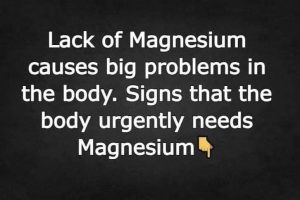
Magnesium is an essential mineral that plays a vital role in numerous physiological functions within the body. It is often overlooked despite being involved in over 300 enzymatic reactions that are critical for maintaining optimal health. Understanding the significance of magnesium can empower individuals to make informed choices about their dietary intake and overall wellness.
Importance of Magnesium for Muscle Function
One of the most well-known functions of magnesium is its contribution to muscle function. This mineral aids in muscle contraction and relaxation, ensuring that our muscles function efficiently during physical activity. Magnesium works in tandem with calcium, which stimulates muscle contraction. Adequate magnesium levels are essential for preventing muscle cramps, spasms, and fatigue, especially during intense exercise or physical labor. Without sufficient magnesium, muscles may become overactive, leading to discomfort and impaired performance.
Nerve Health and Function
In addition to its role in muscle function, magnesium is crucial for maintaining nerve health. It helps regulate neurotransmitters, the chemicals that transmit signals throughout the nervous system. Proper magnesium levels support the nervous system’s ability to communicate effectively, which is essential for coordination, reflexes, and overall cognitive function. A deficiency in magnesium can lead to heightened nerve excitability, potentially resulting in symptoms such as anxiety, irritability, and sleep disturbances.
The Connection to Bone Health
Magnesium is also important for maintaining strong and healthy bones. Approximately 60% of the body’s magnesium is stored in the bones, where it plays a key role in bone formation and density. Research has shown that low magnesium levels can contribute to the development of osteoporosis, a condition characterized by weakened bones and an increased risk of fractures. Ensuring adequate magnesium intake can help mitigate these risks and promote overall skeletal health.
Impact on Heart Health
Beyond muscle and nerve health, magnesium is critical for cardiovascular health. It aids in regulating blood pressure by helping blood vessels relax, which can reduce the risk of hypertension. Additionally, magnesium plays a role in maintaining a regular heartbeat. An imbalance in magnesium levels can lead to arrhythmias, or irregular heartbeats, which can pose serious health risks.
Magnesium also helps to regulate blood sugar levels and cholesterol, making it a key player in managing conditions such as diabetes. Studies have indicated that individuals with higher magnesium intake have a lower risk of developing type 2 diabetes, as magnesium is involved in insulin secretion and glucose metabolism.
Signs and Symptoms of Magnesium Deficiency
Given its importance, a deficiency in magnesium can lead to a range of health issues. Common symptoms include muscle cramps, fatigue, sleep disturbances, and irregular heartbeat. Individuals may also experience increased anxiety or mood changes. Chronic magnesium deficiency can have more severe implications, such as contributing to the development of osteoporosis, cardiovascular disease, and metabolic syndrome.
Strategies to Boost Magnesium Intake
If you notice symptoms that may indicate low magnesium levels, it’s essential to consider boosting your intake. Incorporating magnesium-rich foods into your diet is an effective way to enhance your levels. Foods such as leafy green vegetables (like spinach and kale), nuts (especially almonds and cashews), seeds (like pumpkin and chia seeds), whole grains, and legumes are excellent sources of magnesium.
In some cases, dietary changes may not be sufficient, and magnesium supplements can be considered. However, it’s important to consult with a healthcare provider before starting any supplementation, as excessive magnesium intake can lead to adverse effects.
Magnesium is a crucial mineral that supports a variety of bodily functions, from muscle contraction and nerve signaling to bone health and cardiovascular stability. Recognizing the signs of magnesium deficiency and taking proactive steps to ensure adequate intake can significantly impact overall health and well-being. By prioritizing magnesium through diet and, if necessary, supplementation, individuals can support their muscle function, enhance nerve health, and promote a stronger, healthier body.





